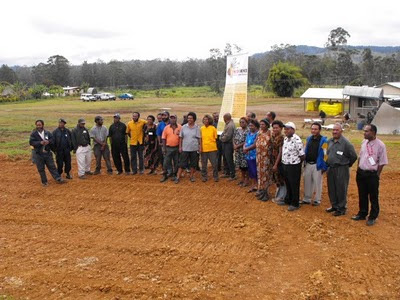Media Literacy Workshop Participants in SIL Ukarumpa, 2009. Photo credit: Steven Winduo
The declaration: “So you are a writer. What do you do?” is used by those who do not know what a writer does. Many people tend to think a writer is someone who lives in the world of imagination without any sense of reality. Many people tend to think of a writer as someone who has no time for other interests or occupations in life, except the world of the books.
I have lived my life as a writer for the last 25 years. I don’t know the reasons I became a writer or the reasons I chose to write. All I remember now is that my teachers introduced me to the wonderful world of creative writing in national high school that changed my life in unimaginable ways. That’s what it was, just creative writing. Writing is something no one chooses to do to earn a living or to make money. Creative writing is something people do as a hobby or as an extra-curricula activity.
It is not something the English teachers or anyone would recommend for a student to consider as a serious career. Be something else might be the answer if the teachers detect a budding writer in the making. And, they are right in many ways. There is no economic sense in becoming a writer in Papua New Guinea. No one in Papua New Guinea is a fulltime writer. Many of our writers have a primary salaried job (outside of our writing life) to put bread and butter on the table before we sit down to write the work that we hope to publish or recite to others with keen ears.
The decision to write comes with the notion of consistency. Consistency enables a writer to remain committed to the art of writing. The opportunity to publish a work is not easy or writing a piece that survives the test of time is not laid across the pathway of a writer.
It is the sense that one writes because that’s what one is passionate about or likes doing to breathe in a world congested with so much tensions and anguish. Choosing to write is a decision to remain focused on the act of writing itself, a process of self-expression and self-representation that brings into focus the general experiences of human society. A writer is seen as someone who is also speaking about the experiences of others.
I had an interesting life as a writer. Apart from publishing my works in local and international literary journals and anthologies I have read my poetry on NBC and ABC, in universities and schools such as Sogeri National High School, Gerehu Primary School, Gordon Secondary, POM Grammar, and Port Moresby Institute of Education.
The universities I have read my poetry include UPNG, University of the South Pacific (Fiji), University of Queensland, James Cook University, Sydney University, University of Canterbury (NZ), University of Hawaii (USA), University of Minnesota (USA), and Alberta University (Canada). Some of the places I have read my poetry are interesting and memorable that the experiences leave me satisfied as a writer. In Canada I read my poetry to a packed room on the second floor of a noisy cafeteria on the campus of Alberta University. In Townsville I read my poetry in the Townsville Art Gallery. With Suva based writers I read in a pub called Traps in downtown Suva, Fiji. In Minnesota I read in a writer’s loft in downtown Minneapolis, and in Hawaii, in the conference room of the Hamilton Library of the University of Hawaii. In many of the international fixtures I have had the good fortune of being sponsored by my hosts in those countries.
The decision to become a writer carries with it a social responsibility. Getting paid for what I write is not a salaried life, but one that comes in drips and drabs. In the days when the National Broadcasting Corporation (NBC) paid writers for writing and reading their works I earned enough to pay for my younger siblings’ school fees and my own basic toiletries while I was still a UPNG student.
In the life one chooses to live as a writer, one has to deal with others who come into your life as girl friends, then wife, children, grand-children, and a countless hosts of relatives. Seeing a cheque in the mail does not mean that you deposit it in the bank and wait seven days to three weeks before withdrawing. You know you have to deal with the incessant nagging from the wife to have part of that cheque, then the children want this and that because the last time you promised them a bicycle or a Nitendo and you never kept the promise. And what about the grand-children?
The relatives and your communities do not care where you get the money. The social obligation you have is to support them by way of school fees, haus krai, custom, bride price, fundraising, church contributions, and what else? Any way the thing is, the life of a writer has its costs and benefits calculated into its design that the best strategy for a writer in Papua New Guinea is not to be a full-time writer, but to have a salaried job to support your writing life.
I handle these demands as a writer by expanding the things I can do as a writer, not just writing poems and reading, but selling my skills and knowledge as a writer/editor to individuals and organization who can pay for consultation, writing workshops and clinics, copyediting of reports, papers, and books. A writer’s life is more than an imaginary one.

Comments
Post a Comment